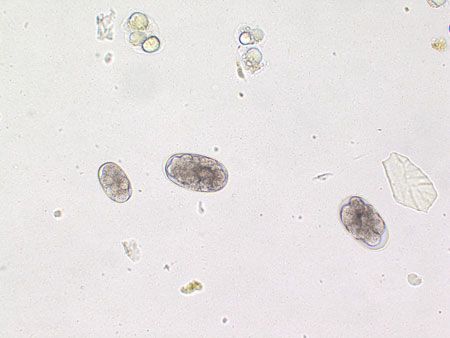Image quiz: Persistent evidence of parasites on a fecal flotation test
This pet has been treated multiple times for similar findings, can you figure out whats going on with the beagle mix?

Image courtesy of Aly Chapman.
Which parasites are shown in the figure above?
a) Trichuris vulpis
b) Toxocara canis
c) Dipylidium caninum
d) Ancylostoma caninum
Click to page two to see the answer.
Answer: D-Eggs of Ancylostoma caninum (hookworm eggs)
This dog was previously treated three separate times with fenbendazole or pyrantel pamoate after veterinary teams found similar eggs on the fecal floatation test. What is the most likely reason for the continued detection of these eggs despite treatment?
a) Ingestion of arthropod intermediate host leading to reinfection
b) Anthelmintic resistance, which is commonly reported for this parasite
c) Larval leak that occurs after treatment
Click to page three to see if you are correct!
Answer: C-Larval leak occurring after treatment
Larval leak is the most common cause for recurrent hookworm infections that do not clean up after treatment. Infections in dogs with canine hookworm larvae due to Ancylostoma or Uncinaria species often lead to a subset of larvae arresting in the somatic musculature of the host. Upon treatment and killing of the adult hookworms in the lumen of the host's intestines, some larvae will be activated and within a few weeks develop into adults in the small intestines of the dog. This phenomenon is repeated following subsequent treatments.
Although hookworms can use paratenic (i.e. transport) hosts generally consisting of small mammals, there is no arthropod intermediate host associated with transmission.
Anthelmintic resistance of canine hookworms is virtually nonexistent, but drug resistance is often incorrectly blamed for the larval leak mechanism. Prevention of infection via limiting predation, minimizing environmental contamination, and using monthly preventives should be emphasized to clients.
Dr. Richard Gerhold works in the Department of Biomedical and Diagnostic Sciences in the College of Veterinary Medicine at the University of Tennessee.